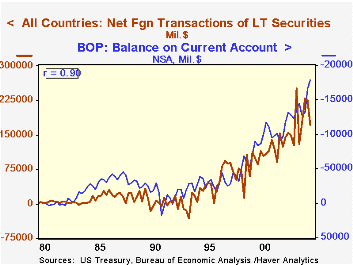 Global| Jan 19 2005
Global| Jan 19 2005Net Foreign Purchases of Securities in US Market Up Sharply in November
Summary
Net purchases of securities by foreign investors in US markets surged to $81 billion in November, the largest in five months, and well above October's $48.3 billion. These increasingly prominent data are from the US Treasury's monthly [...]

Net purchases of securities by foreign investors in US markets surged to $81 billion in November, the largest in five months, and well above October's $48.3 billion. These increasingly prominent data are from the US Treasury's monthly Treasury International Capital ("TIC") tabulation and were released yesterday. They are contained in Haver's USINT database in the section "US International Investment Tables", shown by security type and country. They cover purchases and sales of securities with maturities longer than one year.
Foreign investors increased their net buying of every major type of domestic securities in November and reduced their liquidation of foreign bonds sold in US markets. The only sector where their net sales increased was foreign stocks traded in the US. Among countries, investors in several major regions increased their participation in US markets. Japanese net purchases were $19.8 billion, up from $4.8 billion in October. Chinese investors increased their purchases, mainly of Treasuries, to $13.9 billion from $6.4 billion the month before. UK investors bought on net $29.8 billion, heavily in equities.
These securities purchases have over long spans of time been highly correlated -- negatively -- with the current account balance. As seen in the graph, over the past 25 years, this correlation has stood at a substantial 95%! In one sense this is almost tautological: balance of payments accounting means a rising current account deficit must be accompanied by increasing foreign investment. But there are several other types of financial participation not covered by the TIC report: all short-term securities, bank loans, trade credit, direct investment and so on. So there are plenty of other ways to "finance" the current account. At the same time, some observers believe that a rising current account deficit is itself so indicative of fundamental imbalances in a country's economy, that it should discourage foreign participation in that nation's capital markets. There is some slight evidence that this might have occurred in 2004 as foreign securities purchases look to have interrupted their seemingly ever-expanding trend. However, as noted in the tight correlation ratio cited above, past performance suggests the current account per se has not bothered them before. Instead, they perhaps are asking the same kinds of questions that domestic investors ask: how will the US economy respond to the surge in energy prices? how is confidence impacted by the war in Iraq? are US consumers carrying too much debt? Before the election, uncertainty was even greater, and these November figures do indicate that once that question was answered, foreign investors resumed more vigorous activity in US financial markets.
| Net Foreign Purchases of Securities in US Markets (Billions US$) | Nov 2004 | Oct 2004 | Sept 2004 | Last 12 Months Average | Monthly Average|||
|---|---|---|---|---|---|---|---|
| 2003 | 2002 | 2001 | |||||
| Total | 81.0 | 48.3 | 61.1 | 69.0 | 57.0 | 47.9 | 41.8 |
| Treasuries | 32.0 | 20.9 | 16.6 | 31.3 | 22.8 | 10.0 | 1.5 |
| Federal Agencies (mostly "GSEs") | 27.9 | 21.9 | 8.4 | 18.5 | 13.8 | 16.3 | 13.7 |
| US Corporate Bonds | 25.3 | 19.1 | 43.6 | 23.4 | 22.4 | 15.2 | 18.5 |
| US Corporate Stocks | 14.5 | 3.5 | -2.9 | 2.7 | 3.2 | 4.2 | 9.7 |
| Foreign Bonds | -2.6 | -4.5 | -0.8 | 0.6 | 1.7 | 2.4 | 2.5 |
| Foreign Stocks | -16.1 | -12.6 | -3.8 | -7.6 | -6.9 | -0.1 | -4.2 |
Carol Stone, CBE
AuthorMore in Author Profile »Carol Stone, CBE came to Haver Analytics in 2003 following more than 35 years as a financial market economist at major Wall Street financial institutions, most especially Merrill Lynch and Nomura Securities. She had broad experience in analysis and forecasting of flow-of-funds accounts, the federal budget and Federal Reserve operations. At Nomura Securities, among other duties, she developed various indicator forecasting tools and edited a daily global publication produced in London and New York for readers in Tokyo. At Haver Analytics, Carol was a member of the Research Department, aiding database managers with research and documentation efforts, as well as posting commentary on select economic reports. In addition, she conducted Ways-of-the-World, a blog on economic issues for an Episcopal-Church-affiliated website, The Geranium Farm. During her career, Carol served as an officer of the Money Marketeers and the Downtown Economists Club. She had a PhD from NYU's Stern School of Business. She lived in Brooklyn, New York, and had a weekend home on Long Island.
More Economy in Brief
 Global| Feb 05 2026
Global| Feb 05 2026Charts of the Week: Balanced Policy, Resilient Data and AI Narratives
by:Andrew Cates





